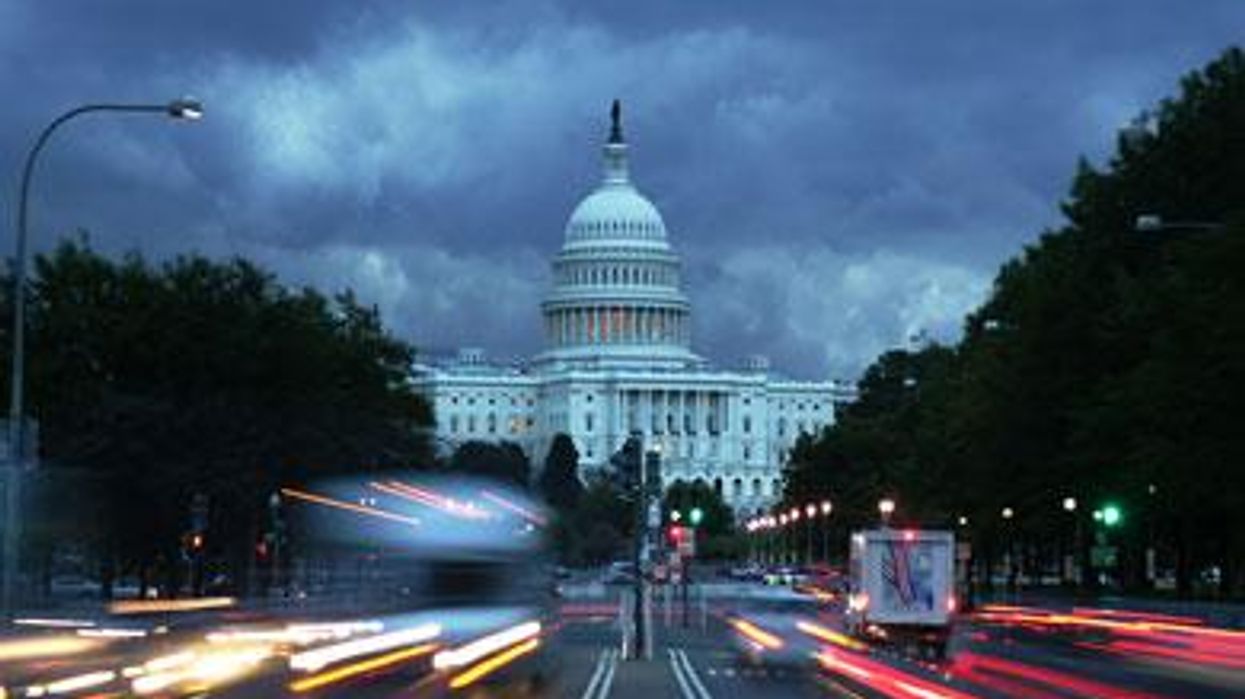CONTACTAbout UsCAREER OPPORTUNITIESADVERTISE WITH USPRIVACY POLICYPRIVACY PREFERENCESTERMS OF USELEGAL NOTICE
© 2025 Equal Entertainment LLC.
All Rights reserved
All Rights reserved
By continuing to use our site, you agree to our Privacy Policy and Terms of Use.
We need your help
Your support makes The Advocate's original LGBTQ+ reporting possible. Become a member today to help us continue this work.
Your support makes The Advocate's original LGBTQ+ reporting possible. Become a member today to help us continue this work.
Every once in a very long while, Robert Gibbs goes out of his way to make a point, and it's worth noticing when he does.
So when Gibbs employed the word "odd" to describe the Justice Department's use of Colin Powell's 17-year-old testimony to defend the constitutionality of "don't ask, don't tell" in their latest brief, my ears perked up.
Seems as though the way the DOJ wrote that brief flowed from being a discussion thread for Politico, AmericaBlog.com, and Rachel Maddow right into the walls of the White House. If that were not the case, Gibbs never would have ventured into that territory in response to what was a more general question about whether Justice is too politically tone-deaf on LGBT issues.
It seems the president is not particularly excited about perpetuating a line of defense for the gay ban that might actually harm efforts to repeal it. Perhaps the White House and the DOJ will beef up the vetting process for those briefs before they blindside Obama in the future.
Otherwise, the president may have to suffer through a few more DOJ brief flaps, given the way things are unfolding at the Pentagon. Not only has Defense secretary Robert Gates clearly stated that he believes Congress should wait to repeal the gay ban until the department finishes its internal review in December, but we got our first glimpse last week of at least one of the processes it's using to survey the troops, courtesy of the Associated Press.
Let's just say it didn't seem like a methodology that would fully encourage honest participation from every sector of the armed forces. Apparently, Defense officials gathered about 350 troops in an auditorium and asked them to chime in with specific concerns they had about ending "don't ask, don't tell." Granted, there's no perfect way to take the pulse of service members, but conducting one-on-one interviews seems like it might elicit more honest answers, and anonymous polling of a randomly selected representative sample seems like another good option.
Reading the AP piece, one had to wonder what it was like to be a
closeted gay soldier in that auditorium, or how likely straight allies may have
been to pipe up with a note of concern for gay service
members.
Here are some of the
discussion points, according to the AP: "Attendees of the Tuesday
session said that one female Marine stated that bunking with a lesbian
would be the same as being told to share a room with a man. A soldier
said he didn't want to wade into the political debate and that he would
follow orders. Another service member asked if a gay service member who
gets married -- now forbidden under law -- would receive military family
benefits."
Fascinating. Especially the woman who said sharing
quarters with a lesbian would be no different than doing so with a man -- this of course assumes that she hasn't already bunked with a lesbian.
That premise falls into the "ignorance is bliss" category since lesbians
are already serving in the military, as are gay men; many of them just
aren't visible to their peers at the moment. Lifting the ban simply
means that all service members would have a better chance of knowing who
is gay and who is not -- it does not mean that suddenly there would be
gay soldiers in the ranks where there had not been before.
As
Congress returns to work this week, all LGBT eyes will be on two agenda
items: the Employment Non-Discrimination Act and DADT, with the Domestic Partnership Benefits and
Obligations Act running third.
And a key question is whether one
major obstruction to progress, especially on ENDA, could be the House
Democratic caucus. The Hill newspaper is already reporting this morning
that a Democratic leadership aide said there would be "no more tough
votes" during the April and May legislative work period.
This
jibes with what one Capitol Hill insider told me about Speaker Nancy Pelosi wanting
to "take the temperature" of the feedback Democratic House members got
from constituents during recess in the aftermath of their health care
vote. The Democratic caucus meeting on Tuesday evening will surely
center on this topic, but it seems some Democratic leaders are already
starting to draw lines in the sand and send signals.
What isn't clear is whether ENDA falls into the category of "tough
votes" with 198 cosponsors while 216 votes are needed for passage. Rep.
Tammy Baldwin has said the votes are there;
all three gay elected members have gone on record saying the committee
and full House vote are likely to happen shortly after return from
recess.
A spokesman for the speaker pushed back on the Hill
article and the notion that leadership would take a pass on difficult
issues.
"The speaker has repeatedly said that every vote is a
heavy lift," Drew Hammill wrote me. "Congress will continue to work to
address the needs of the American people."
Nonetheless, we are
most certainly entering what I think is fair to frame as a do-or-die
legislative work period on LGBT issues in April and May. As political pundit Nate Silver reminded
us Friday, the prospects for Dems keeping control of the House after the
midterms is increasingly grim, so whatever equality issues are not
tackled during this Congress may simply remain stalled during Obama's
presidency (or at least during his first term).
Swift passage of
ENDA in the House gives the bill a shot at life in the Senate.
Meanwhile, the Senate Armed Services Committee's consideration of the Defense Department
authorization bill, which is where a DADT repeal measure will either
succeed or fail, is likely to be at the end of May.
And despite the swipe
at Justice last week, the White House has been MIA on both pieces of
legislation ever since President Obama's "don't ask, don't tell" mention
in January's State of the Union address.
From our Sponsors
Most Popular
Bizarre Epstein files reference to Trump, Putin, and oral sex with ‘Bubba’ draws scrutiny in Congress
November 14 2025 4:08 PM
True
Jeffrey Epstein’s brother says the ‘Bubba’ mentioned in Trump oral sex email is not Bill Clinton
November 16 2025 9:15 AM
True
Watch Now: Pride Today
Latest Stories
Anti-LGBTQ+ hate crimes reached record-highs last year in this gay haven
December 05 2025 1:16 PM
Three lesbian attorneys general beating back Trumpism in court warn of marriage equality’s peril
December 05 2025 12:07 PM
Trump DOJ rolls back policies protecting LGBTQ+ inmates from sexual violence
December 05 2025 11:12 AM
Georgia law banning gender-affirming care for trans inmates struck down
December 05 2025 9:40 AM
Tucker Carlson and Milo Yiannopoulos spend two hours spewing homophobia and pseudo-science
December 04 2025 4:47 PM
'The Abandons' stars Gillian Anderson & Lena Headey want to make lesbian fans proud
December 04 2025 4:38 PM
Tig Notaro is working on a 'hot lesbian action' movie with Zack Snyder
December 04 2025 4:36 PM
Cis men love top surgery—it should be available for all
December 04 2025 4:35 PM
Denver LGBTQ+ youth center closed indefinitely after burglar steals nearly $10K
December 04 2025 12:57 PM
Trans pastor says she’s ‘surrounded by loving kindness’ after coming out to New York congregation
December 04 2025 11:13 AM
Lesbian educator wins $700K after she was allegedly called a ‘witch’ in an ‘LGBTQ coven’
December 04 2025 10:59 AM
Years before Stonewall, a cafeteria riot became a breakthrough for trans rights
December 04 2025 10:50 AM
Charlie Kirk’s widow set to join out CBS News chief Bari Weiss for televised town hall
December 04 2025 10:20 AM
Women's Institute to ban transgender women after U.K. Supreme Court ruling
December 03 2025 4:10 PM




































































Charlie Kirk DID say stoning gay people was the 'perfect law' — and these other heinous quotes